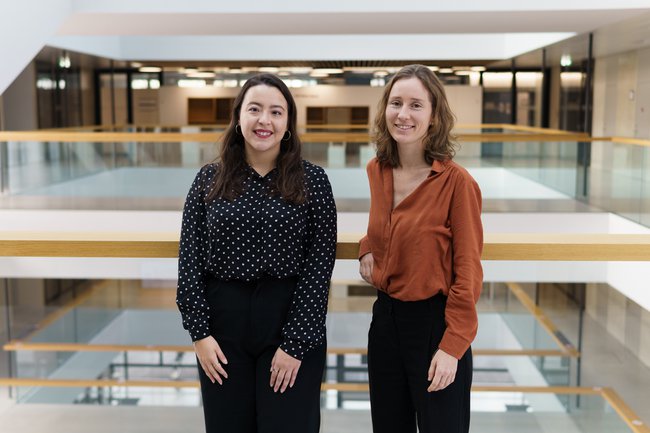Gender & Diversity at the St. Pölten UAS: A Portrait of Our Team
From accessibility to gender-inclusive language: Talking diversity, visibility, and inclusion
What is it that the St. Pölten UAS’ Gender & Diversity team does exactly?
In an interview with Margit Wolfsberger of the Campus & City Radio St. Pölten, Anna Steinberger and Dilara Gündüz provide interesting insights into their work – from accessibility in teaching through inclusive language to the Inclusion Action Week planned for May.
This week is open for all and shows how we practice diversity on campus.
- You are cordially invited to the Inclusion Action Week – particularly on 15 and 16 May
Click here for information and all programme items. (in German) - The full interview with Anna Steinberger and Dilara Gündüz is available here.
Interview (extracts) with Anna Steinberger and Dilara Gündüz
What is the job of the Gender & Diversity Office at the St. Pölten UAS?
Anna Steinberger:
Our office has a very diverse range of tasks – as the name indicates: gender and diversity. The challenge was to develop a work programme that fits the UAS, helps it along, and can be readily implemented. Our work is based on different pillars: First, the Statutes – especially ‘Part 3 on Equality and the Promotion of Women’ – and second, the Gender Equality Plan, our self-developed catalogue of objectives and measures.
Our topics range from accessibility and family friendliness to inclusive communication and all-gender toilets, and they are directed at everyone at the UAS: staff members and students.
Dilara Gündüz:
We also organise events. Our big Inclusion Action Week is coming up in May – the most important days are 15 and 16 May, and the programme is open for all.
Then there are the Gender & Diversity Awards where students’ final theses with a focus on G&D topics can win a prize – the submission period starts in May.
Another important point is our free holiday childcare option that we offer during Easter week and for three weeks in the summer – primarily for employees but also for students.
Anna:
In 2023, we underwent an audit process – since then, we have been certified as a family-friendly university. We also have a parent-child room that everyone with childcare responsibilities at the UAS can use as needed.
On gender mainstreaming and accessibility
Anna:
We base our work on scientific evidence. And the studies are clear on this: People are feeling more directly and individually addressed when inclusive language is used, for example through the ‘gender asterisk’ (mainly in German).
Dilara:
Talking of inclusion: We have had two Accessibility Officers at the UAS since January – Anna and, as her deputy, Kerstin.
Anna:
And talking of visibility: 74% of disabilities are invisible. The number of students who contact us for a compensation of disadvantage or accessible teaching has increased considerably. We offer individual advice and try to find solutions together, for example through adjusted exam formats.
What is your wish for 15 years from now?
Anna:
More diversity among staff and students. People from various backgrounds. Yet more flexible working models. And that having people with disabilities working here becomes a matter of course.
Dilara:
My wish is for diversity to be lived naturally – without permanently having to discuss little things. That diversity is simply accepted, so we have room to turn to other things. When gender and diversity are well integrated, this can have positive effects for research, teaching, working, and social interaction. We would be many steps ahead if this were possible.
Shaping diversity together
Learn more about Gender & Diversity at the St. Pölten UAS – from accessibility through family friendliness to inclusive language. More about Gender & Diversity
